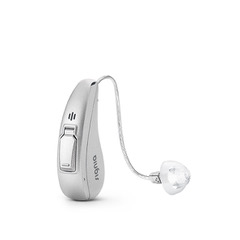Here are 5 of the most common reasons why your hearing aid may not be working and what you can do about it.
-
It is blocked with ear wax
It only takes a very small amount of wax to block a hearing aid. It is completely normal for our ears to produce ear wax, in fact, it’s nature’s way of keeping our ears free from dirt and debris. If the part of the hearing aid that goes into your ear is blocked with wax, the aid will feel more like an earplug than an aid! So, the first thing to do when your hearing aid stops working is to check the end is clean. You should have been given cleaning tools when you were fitted with your aids and instructions on how to clean them. Ideally, you should clean your hearing aids every night to avoid wax building up in them. If you are not able to clean your aids yourself, please bring them into one of our clinics so we can help.
-
The battery is flat
Disposable hearing aid batteries last between one and two weeks. If you have rechargeable batteries, these need to be charged every night. Even if you think the battery is good, if your hearing aid stops working put a new one in/put the aid in the charger to double check. Occasionally you can get a bad disposable battery too. Also keep in mind, disposable batteries do have a use by date (which is normally on the back of the packet).
-
There is a kink or hole in the tubing
This only applies for Behind-the-Ear hearing aids that have a mould or slim tubing attached to them. The tubings on the mould should be changed at least once a year. If you are unsure how to do this or don’t have replacement tubings please contact us to help you. Think of the tubing like a hose, if it gets kinked no water (sound) can get through or if there is a hole in it, the water (sound) will leak out.
-
There is moisture in the hearing aid
Hearing aids are basically tiny computers, and like all electronic devices, they don’t like moisture. Although in recent years, hearing aids have much better moisture resistance, they still need to be kept dry. If your hearing aid becomes intermittent or staticy, it could be due to moisture damage. If you suspect this might be the problem please bring your aid into one of our clinics so we can repair it. Do not leave your hearing aid in the bathroom or immerse it in water and consider using a dry-aid kit (can be obtained from our clinic) to avoid moisture damage.
-
Your hearing has changed
A change in your hearing can mean your hearing aids sound muffled or not loud enough. For most people hearing deteriorates slowly over many years. An annual hearing review is strongly recommended so if any changes have occurred, your hearing aids can be adjusted to accommodate those changes. If a large change in hearing has occurred, we will refer you for medical review if this is appropriate in addition to adjusting your hearing aids. At your annual review we will also clean and check your hearing aids.
The usual lifetime of all hearing aids is five years. Diligent cleaning and regular servicing of your hearing aids will ensure they are reliable for you.
Please do not hesitate to get in touch with us if you have any questions or concerns about the function of your hearing aids.

